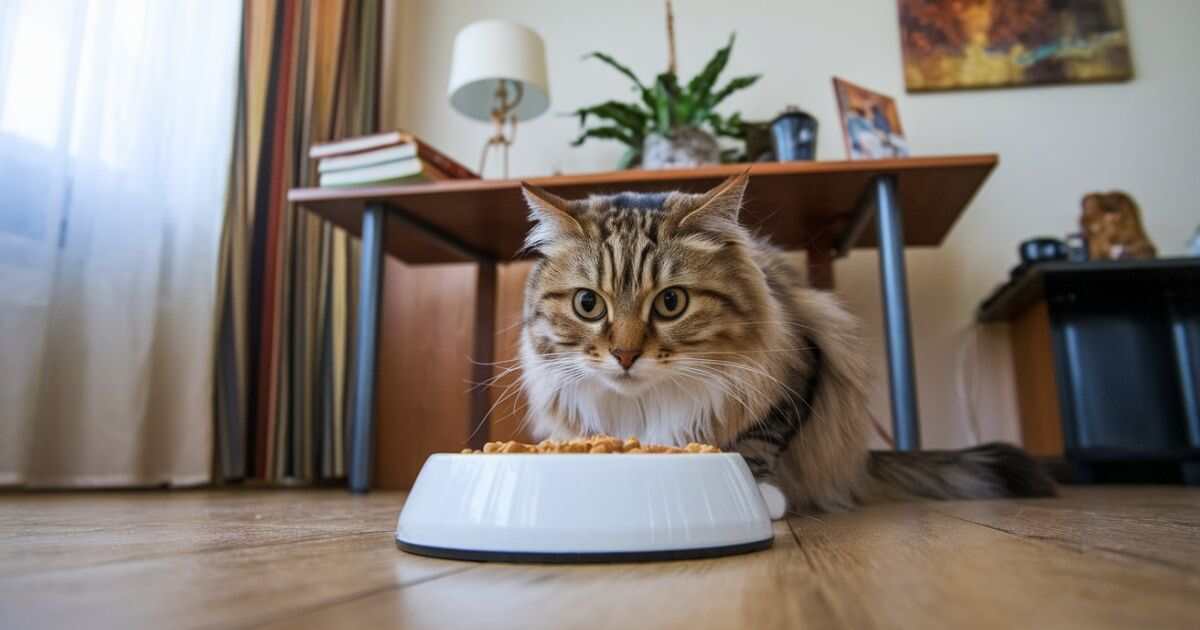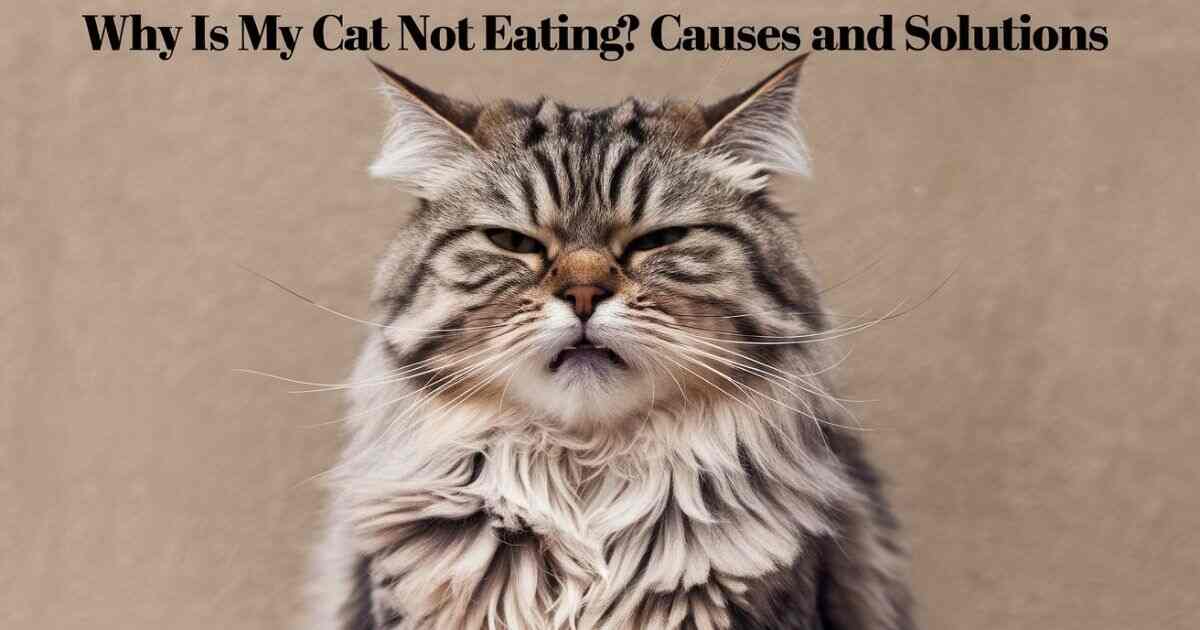Why Is My Cat Not Eating? Causes and Solutions
Seeing your cat refuse to eat can be quite distressing. While cats may appear finicky, a lack of appetite can signal underlying health issues. Determining the cause of your cat’s reluctance to eat is crucial to ensure they receive the necessary care.

There are various reasons why cats may stop eating. They could be suffering from infections, dental problems, or gastrointestinal disorders. Even heart conditions can lead to a decreased appetite. Prolonged refusal to eat can seriously impact their health.
Changes in the environment or stress can also lead to a cat’s reluctance to eat. It’s important to monitor your cat’s eating habits and identify any underlying causes. Working with your veterinarian can help restore your cat’s health and happiness. Understanding why your cat isn’t eating is crucial for their overall well-being.
Common Reasons Why Your Cat May Not Be Eating
If your cat suddenly loses interest in food, there may be various reasons behind it. Identifying why your cat is being picky about food is the first step toward helping them return to a healthy eating routine.
Illness and Medical Conditions
Often, cats stop eating due to illness or health problems. Dental issues, such as infections or pain, can make it difficult for them to eat. Gastrointestinal issues, including parasites or cancer, can also lead to a lack of appetite.
Other medical conditions, like kidney disease or pancreatitis, may also impact their willingness to eat.
Environmental and Behavioral Factors
A range of issues beyond health problems can lead to a cat’s loss of appetite. Factors such as stress, anxiety, and depression can significantly impact their eating habits. Changes in their environment, like moving to a new home or introducing new pets, may also cause distress.
Additionally, some cats are finicky eaters, perhaps disliking their food or eating area. Disruptions like excessive noise or proximity to the litter box can further deter them from eating.
Identifying and addressing the root cause of your cat’s decreased appetite is essential. Whether it’s a health concern or an environmental factor, ensuring that your cat resumes healthy eating habits is crucial for their overall well-being and happiness.
Why Isn’t My Cat Eating? Possible Causes and Solutions
If your cat is refusing to eat, it’s crucial to consult your veterinarian. They can identify the underlying issue and assist your cat in regaining its appetite. There are numerous reasons why cats may stop eating, including health concerns or changes in their surroundings.
Illness is a frequent cause of appetite loss. Conditions like dental problems, gastrointestinal issues, kidney or liver disease, pancreatitis, and even cancer can affect a cat’s desire to eat. Your vet may recommend specific foods, appetite stimulants, or even a feeding tube to encourage your cat to eat properly.
However, not all appetite loss is linked to illness. Factors such as stress, anxiety, relocation, or the introduction of new foods can also deter cats from eating. You might consider warming their food or incorporating new scents to make it more enticing.
It’s crucial to act quickly if your cat stops eating. Cats can only survive a few days without food before facing serious health risks. If your cat hasn’t eaten for 24 hours, you should visit a veterinarian immediately.
|
If your cat hasn’t eaten in over 24 hours, get help right away. Your cat’s health is very important. Quick action can prevent serious problems.
Why is my cat not eating and sleeping a lot?
If your cat is not eating and is sleeping excessively, it’s crucial to reach out to a veterinarian. These signs may suggest several health concerns, such as infections, dental issues, underlying medical conditions, pain, or stress. A veterinarian can identify the root cause and recommend suitable treatment.
Why is my cat not eating but acting normal?
If your cat isn’t eating but appears otherwise healthy, it’s still essential to reach out to a veterinarian. A decrease in appetite, even without other symptoms, can indicate potential health problems. Possible causes for a reduced appetite may include mild illnesses, dental issues, stress or anxiety, or side effects from medication. A veterinarian can help identify the underlying cause and recommend the appropriate treatment.
Conclusion
When a cat refuses to eat, it is a serious concern that requires immediate attention. While cats can be finicky eaters, a complete lack of appetite serves as a warning signal. Identifying the underlying causes, such as health issues or changes in their surroundings, is essential for addressing the problem.
Collaborating with your veterinarian is crucial to restoring your cat’s appetite. If your cat hasn’t eaten in over 24 hours, it’s important to seek veterinary advice promptly. A veterinarian can assess for potential dental issues, gastrointestinal problems, or infections. Monitoring your cat’s eating habits and consulting a vet when necessary is vital for maintaining their health and happiness.
A refusal to eat can indicate a significant issue. Being attentive to your cat’s eating patterns and working alongside your vet will help you understand why your cat is not eating and assist in encouraging them to enjoy their meals once more.
FAQ | Why Is My Cat Not Eating? Causes and Solutions
Q1. Why isn’t my cat eating?
A: If your cat isn’t eating, it can be concerning. This may indicate an underlying health issue, such as infections or kidney failure. Other factors can include recent vaccinations, travel, or feelings of stress or sadness.
Q2. What are common medical reasons for a cat’s loss of appetite?
A: Dental issues or infections can make it difficult for cats to eat. Gastrointestinal disorders, including parasites or cancer, may also lead to a diminished appetite. Conditions like kidney disease and pancreatitis can make cats feel unwell and reluctant to eat.
Q3. Can environmental and behavioral factors influence a cat’s appetite?
A: Absolutely. Changes in their environment can cause stress in cats. Moving to a new home or introducing new people may lead to a decrease in eating. Additionally, some cats are particular and may refuse to eat if their feeding area is noisy or located too close to their litter box.
Q4. How can I tackle my cat’s decreased appetite?
A: If your cat is refusing to eat, consult your veterinarian to determine the underlying cause. They may recommend changing their food, using appetite stimulants, or even considering a feeding tube. At home, you can try offering aromatic canned food or heating their meals. Gradually introducing new flavors can also be beneficial.
